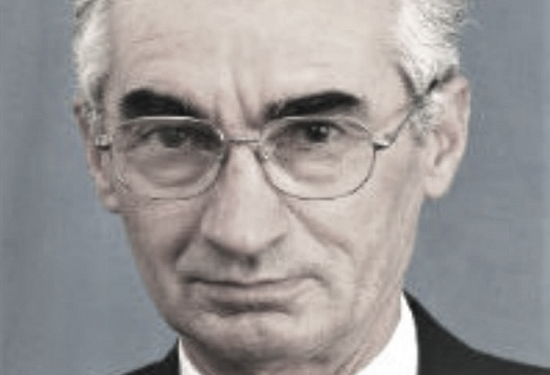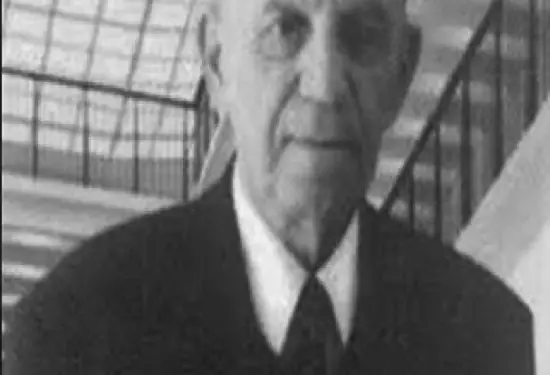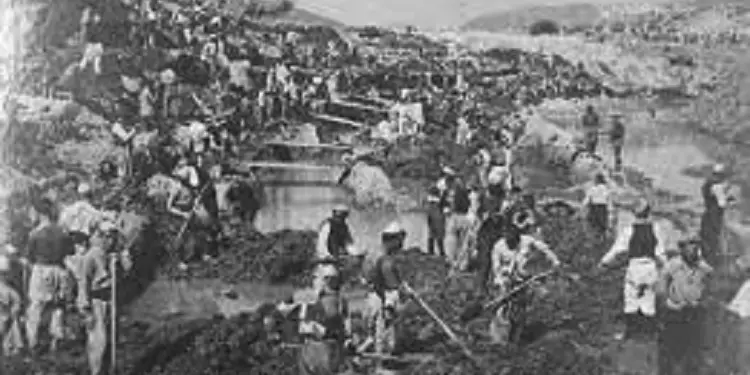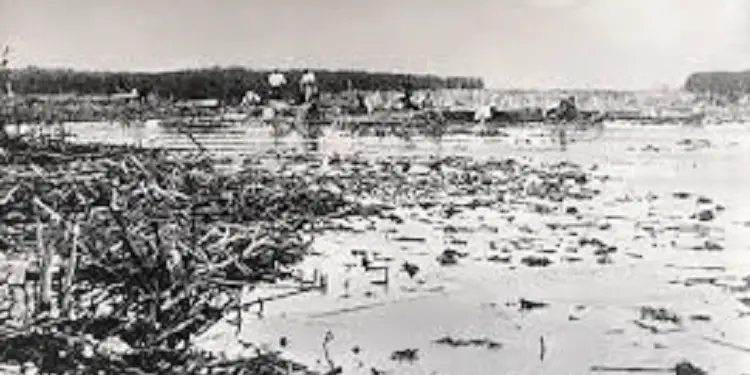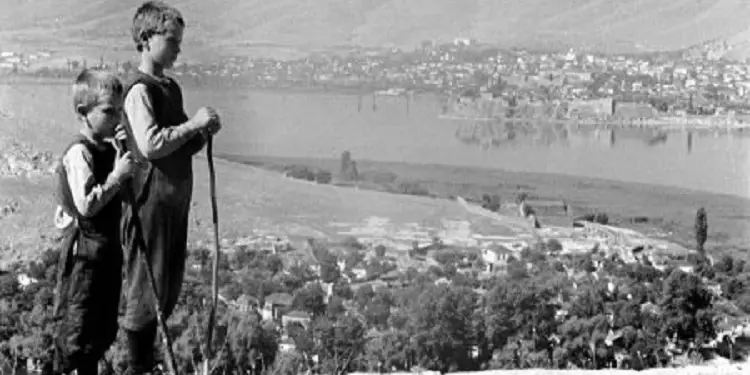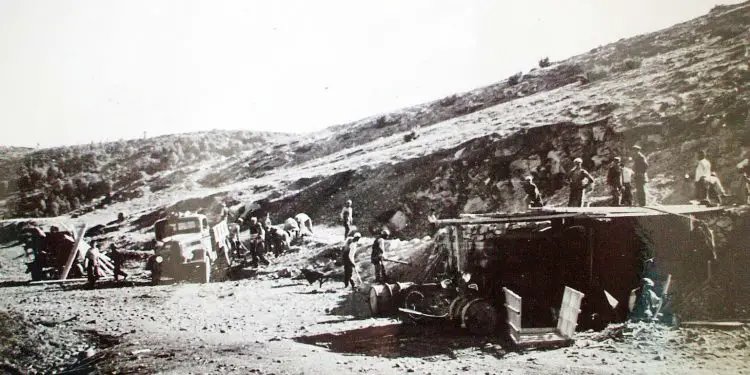By Eugjen Merlika
Part thirteen
– VIOLENCE AND DIGNITY –
(Reading the novel “Swamp of Death” by Makensen Bungo)
Continued from the previous issue…
“One would use violence to dismantle the man, while the other would use patience to preserve personality. “They were facing two opposing forces: violence and dignity.”
In these sentences, which come to the conclusion of the reasoning on an event that marks one of the highlights of the novel “Swamp of Death”, author Makensen Bungo, can be summarized all its meaning. In short, a very broad concept has been expressed, which goes far beyond the scope of the work and becomes synonymous with the essence of a historical period, which the author of the book and his generation lived in all its intensity. The novel reflects the daily life in a forced labor camp, in the first years of the establishment of the communist regime, in Albania after the Second World War.
The events take place in Vloçisht, perhaps the most infamous of the labor camps, the cruelest, the thirstiest for blood and human lives. Located somewhere, on the edge of the Maliqi swamp, opposite the village of the same name, for several months it turned into a terrifying monster that every day, grinding the bodies and souls of its unfortunate inhabitants. One of the most perfect representatives of the Albanian red terror was completely detached from meetings with the world around him; it was an island of torture, pain and death.
The author of the work, then an idealistic boy, condemned by the communist court as an “enemy of the people” and sent together with his ‘normalist’ comrades to the extermination camp, presents us with a shocking truth the environments, events, characters that move in that dark microbot that writes its “history” in their memory. After more than four decades, those deeds come out of the armored cage of memory and are poured on paper, through a pen that has set itself a sacred purpose: to witness the tragedies of an extermination camp, a “gulag” in the well-known Bolshevik style, to honor the memory of those dozens of fallen in it, to fill a gap in the knowledge of historical truth, massacred for half a century.
In these noble intentions he seems to be guided by the teachings of the Prince of Denmark, when he states that: “the purpose of art at all times has been to show its face of virtue, its painting of vileness …”! “Swamp of Death” is a short novel, a work of art in its young age. It is the offspring of the last ten years, when the collapse of the communist dictatorial system brought about the necessity of presenting it in the true light.
The official and professional literature, which had been his spokesperson, was not ready to precede this process. The victims of terror, who managed to survive after the long ordeal of proletarian punishment, had to take the feathers and put them in the service of the memory weakened by the weight of years and physical and spiritual suffering.
Thus was born a new current, a kind of late neorealism, which aimed at photographing a reality already surpassed by events, but present in all cells of life of the country and its inhabitants. This is how they saw the light of “My Prisons”, “Rrno to show me”, “The Cave of Murder”, “The Swamp of Death”, “Roads of Hell”, and many other books that became like beacons of light in the dark corners of the truth of a regime, which based its existence on deception, ignorance and crime.
I think that in this view the novel by Mr. Makensen Bungo deserves special attention for the objectivity that characterizes it. The reader has the impression that he is watching a documentary film, shot from a distance by a third person, an impartial observer of the events that “shudder”. The episodes of the novel follow each other in complete harmony, the characters move naturally in accordance with their story, beliefs, moral formation.
The author delves into the depths of the events and their psychology, avoids excessive rhetoric, but tries to pass under the rays of judgment everything he observes. He is aware that he is present in a scene of endless tragedies caused by a cruel regime that in this scene the eternal struggle between good and evil is constantly taking place.
At the center of the novel is the story of five young people, schoolmates in the ‘Normale’ of Elbasan, members of a non-communist organization called “Free Albania”, arrested and sentenced to five, four, and two years in prison. They are all with liberal ideas, contrary to the ideology of the ruling regime, they dream of a free Homeland, a prosperous, united and prosperous people within its natural borders. They have withstood the violence of the investigation and its traps. The court sentenced one of the members of the group to death and another to life imprisonment.
The other five are assigned to the Vloçisht camp to work on drying up the Maliqi swamp, which would later be trumpeted as a valuable “gift” of the Party to the people of Korça. That swamp, which would swallow in its mud the flower of the intellectual youth of the country, would remain “immortal”, thanks to a novel, which would serve the Albanians for a long time one of the common deceptions of regime.
Sopot, Vullneti, Ahmeti, Hasani and Sala, come to the swamp from the Elbasan prison and there they find others convicted from other places such as Tirana, Korça, etc. They have on their side the momentum of youth, the strength of character, the awareness of the situation, the warmth and sincerity of society among each other, the belief in the justice of the ideal and in the future of their people.
Find a stifling environment in which every day you have to cope with hard work, completely inadequate food, devastating hygienic conditions, worries for families with whom they have lost all connection and above all with the unparalleled cruelty of the camp staff . In front of the prisoners rises like a mountain the mission of resistance. It is an unequal struggle between a handful of bandits who embody the crime returned to the institution and one thousand five hundred men different in age, formation, level, but similar in misfortune, ideals and character.
Commander Tasi, lieutenant, Captain Zeneli, sergeant Hitoja, tetar Aliu, policeman Skënderi, are in constant competition with each other, who invents the most painful torture to try on the forced inhabitants of the camp. They represent the pinnacle of the “power of the people”, the partisans who went to the mountains for the “freedom” of the Homeland. They are the most loyal soldiers of the revolution that would bring equality, prosperity and progress to Albania. They are, in fact, champions of cruelty, of the absence of any human principle, of ignorance.
They are machines of the fiercest violence, kinds of beasts with human faces, executioners for whom human life is not even worth a drop of water. It is they and their peers, with the blindness and sadism that suits you, the guarantee of the system, the main pillar on which it rests. Are they or their friends the “silent heroes”, for whom a whole literature wrote a multitude of works, exalting them to greatness…!
For them, the prisoners are not people, they are not Albanians, and they are not brothers of one blood and one language, but “extraterrestrial” enemies, who threaten their “civilization”. To them and to those who teach them they are called filthy pigs, vile reactionaries, filth, old foxes, dogs, criminals, murderers, filth, tsarists.
As after the camp commander, who was a half-illiterate man with two school classes, the brother of a senior Party leader: “… they are all enemies of the people? They imprisoned us; they tortured us, burned us, and killed us. Twenty-eight thousand martyrs have killed them. They burned and reduced Albania to ashes. They will pay for their crimes. These reactionaries will leave their skin here … “!
Having these convictions, these instructions, this hatred, it goes without saying that what treatment has been done to the convicts. The episodes of torture described in the book are numerous, revealing an unparalleled savagery. Beating with sticks, diving in the mud, drowning, sentences without bread, insults, murders have become daily practice. The tortures are in proportion to the character of the prisoners, to their personality, to the determination not to bow down. In this regard, the “inventions” of the police in their full power, enrich the large reserve of torture “Production of Albania”.
This describes the spitting by all the convicts of one of them, previously beaten and massacred by the police, the diving to the throat of the Korça traders, the compulsion of the people of Peqin to eat the cigarette butts and to beat each other, the beating to death until the last moment of a father in the eyes of his son, leaving in the sun naked after being immersed in the thick mud, until the hanging of man in a pillar for six days and nights in a row. It seems that the pivot of this black environment is Captain Zeneli, about whom the author writes: “The joy of that monster was the tortures and the happiness for him was the suffering he caused to the people. He did not understand life without violence and did not feel calm, if he had not tortured, at least one person a day”!
In the center of the camp was a barracks named “Library”, was the place of horror where Captain Zeneli and his colleagues “educated” through the wall, the prisoners. The name is the mask that hides the truth, like the “reeducation” that covers extermination. These are the capabilities and merits of a system that, through the facade of propaganda, has made supporters and adherents all over the world. Some of them still do not know or do not want to admit what was hidden behind that facade.
The “swamp of death” is a small part of the reality that was the dictatorship of the proletariat in Albania, one of its darkest. The author is aware of it but has the merit of not falling into the lap of despair. The message of the novel is optimistic, life goes on and if the forces of evil and death seem to take precedence. People fail to perish spiritually, as dictatorship wants.
They suffer, they suffer torture, in some cases they even break, in another, with an admirable dignity they reach the point of self-sacrifice, but in general they stay. It is this resistance, the invisible thread that pervades the whole work, as it has permeated the lives of many Albanians in this half-century of extraordinary trials. It is this endurance that makes the author proud of his comrades-in-arms and his people, because the people cannot be identified with a group of criminals that time has brought to their heads, nor with their blind tools.
Resistance to violence was multifaceted. It started with the teary eyes of mothers, wives and daughters watching from afar their sons, husbands, fathers, brothers who, bound in chains, set off for distant roads. The Albanian woman was, in this major test, the real heroine of the time deserves a high pedestal. She, the Albanian woman, trampled by a backward mentality inherited from the five hundredth anniversary of the Ottoman Empire, showed that she was the real life force of this society. It was she who took on the burden of families without men, of raising children without fathers, of roads with bags in hand to bring a little hope and a little food taken out of the mouths of children, convicted relatives all over Albania.
It was she who withstood the various pressures, in which she put a system aimed at the moral decay and physical mutilation of that part of the population that could not become red. It was Albanian women who suffered endless prisons and internments, beginning in old age and ending in old age. They endured hard work and endless deprivations in the name of a concept of honor and dignity that parents of another time had instilled in their blood.
To those who identify today’s evil phenomena of a minority of Albanians with our people, we must tell aloud who the Albanian woman really is, what tests she went through in “wishing for communism”. It is worth remembering together with the author:
“What have these mothers suffered?
Their horror is not forgotten, when the boys’ clothes were brought from the dungeons, drenched in blood! Their desperation is unmatched when they learned how much their innocent sons were punished! They were unmasked in the neighborhood. They insulted them, despised them, left them jobless, and interned them. They hugged the boys only in dreams. They also forgot the voice of their sons. From sufferings they faded prematurely; from the horrors shrank at a young age. Every gray a suffering; every wrinkle a horror. In the last moments, in agony, these mothers kept their eyes on the door, watching that the boys would not come to see them for the last time. But they were far, far away: in Spaç, in Burrel, in Bulqiza, in Ballsh”!
Resistance is revealed to us in the novel not only through enduring daily torture, hunger, lice, insults, sticks, fatigue, but also protecting the inner world and its components, respect for oneself, one’s friend, one’s memories, one’s to family members, to the true values that give meaning to the word “man”. Like candles in the darkness of the swamp of cruelty, Sopot’s love for the teacher’s daughter shines, Daut Burma’s will “Tell my sons that I have never shamed them …, so that for me they do not keep their heads down”, the end of Father Joseph, a missionary of the word of Christ who, to the last breath, raised hopes for the overthrow of the regime, solidarity among one another, the sharing of rations of bread or tea with condemned comrades, the slain conscience of Sala, the secret surrender of friend package, etc.
Resistance to evil is not just a quality of the convicts. For the author, the world is complex and this vision makes him come out of the Manichean schemes of seeing black and white reality and gives strength and truth to the message of the novel. One of the most striking and attractive figures, which is worth dwelling on, is that of the geometer. He is a boy about thirty years old, who was a partisan and who is the son of a martyr. He is in charge of technically directing the works of Vloçisht. He once believed in the idea that communism would heal the wounds of humanity and bring about Albania’s progress. His idealism goes into crisis when he sees and understands the truth. His “human face” socialism crumbles under the batons of police officers on the bodies of convicts.
The sincerity of his nature cannot accept the obligatory compromise of making him deaf and blind. “We fight for all Albanians to live in peace as brothers,” the words of the commissar when he was a partisan still ring in his ears. But in front of his eyes, Tetar Aliu had stuck his nails in the throat of an old prisoner; until he left him dead on the ground happy that he already had “one less enemy”. In another case, he manages to stop the policeman who tries to hit Sokol lying on the ground again without feeling the beating.
Doubt about the honesty of the war motives, gives way to mental and ideal separation from them and the environment in which he has cultivated and in which his family is. “The geometers reminded you of Vullnet who spat on him, Sopot who tortured him, Ahmeti who put him in the mud. He sighed deeply. There was a great pity on his face. He said slowly: why did we fight for these? ” (They say that the same expression was said by a former general and fighter of Spain, in the famous plenum of Tirana in 1956, showing the dress of Nexhmije Hoxha who was sitting next to him.)! Memorie.al




